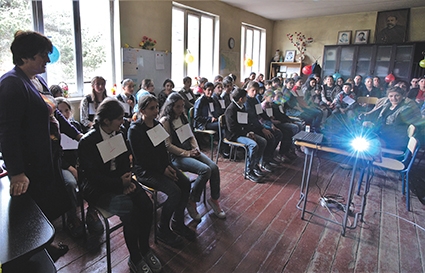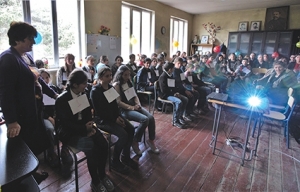Stay for a Spell: Etseri, Svaneti
We recently hosted the winners of local English spelling bees from eight village schools in Upper Svaneti for the regional finals. This whole thing had been organized by my dear wife a couple of months in advance, to allow time for those locals and this wrap-up. She stipulated two groups, grades five through eight, and nine through twelve, but all were to study the words from the English World level two book. She put them into alphabetically ordered sets by last name, so that my word list would be completely fair as I had no knowledge of their order until they had all gathered.
It was pretty fiercely competitive! Of 37 entrants in the two groups, watched by their own English teachers and some directors and Darejan, the regional boss for education, the field quickly narrowed.
We had strict rules for silence or you’d face ejection from the room, including radio silence in the form of requiring all mobile phones to be turned off. Two exceptions: the teacher we asked to be official photographer (using her mobile) and Darejan, who apparently is required by her job not to turn the thing off ever. But we also gave contestants the right to request a complete re-start on any word if a phone call interrupted it and their concentration. Honestly, how did we live without these devices a couple or three decades ago?
Many pupils were eliminated on their first word. English offers myriad pitfalls in the chasm between its written and pronounced forms, both of which have variants anyway (spelling and accent or dialect). Georgian, by contrast, is such a phonetic language that a spelling bee simply wouldn’t work in it; the average grade one child knows how to spell any word you care to offer them in this language, even if they have no clue what it means, assuming it’s not too long for them to remember. As for completely non-alphabetic languages… well, they don’t use letters, so, good luck with that. The body of “things we humans speak in” offers vast and fascinating diversity in every way, from sounds to writing systems to grammar, for the linguist, casual or serious.
I, as the only native speaker present, was asked to be the pronouncer of all words. A jury was chosen in case any disputes came up, which they did not. And Darejan was final adjudicator, again unnecessary in hindsight but at least available.
In both age groups, it soon became an elimination contest for third place, then between first and second. Back and forth, back and forth went the words; I had over 260 on my list, and we didn’t come close to finishing that off, but the “tennis match” craning of our necks back and forth in silence except for words being spoken and spelt was full of drama. I would say each word, the contestant would repeat it, ask for an English definition if wanting one (none did), then begin spelling, and signal a finish by saying the word again. They could start again, if recognizing a mistake, only before this final say of the whole word. Otherwise they were committed.
There was a reasonable spread of schools among the three and three winners, but all were girls. The older group’s first place victor was so confident of herself that I could tell, in every case, that she knew she had got it right before I confirmed this.
It was a quiet but powerful success, and the general consensus was that we should do more of this, because of the competition and thus the study towards excellence it promotes. And some surprising gifts among those who had not evinced them heretofore were most gratifying to discover. There will be more bees, it seems.
Tony Hanmer has lived in Georgia since 1999, in Svaneti since 2007, and been a weekly writer for GT since early 2011. He runs the “Svaneti Renaissance” Facebook group, now with nearly 1500 members, at www.facebook.com/groups/SvanetiRenaissance/
He and his wife also run their own guest house in Etseri:
www.facebook.com/hanmer.house.svaneti
Tony Hanmer












